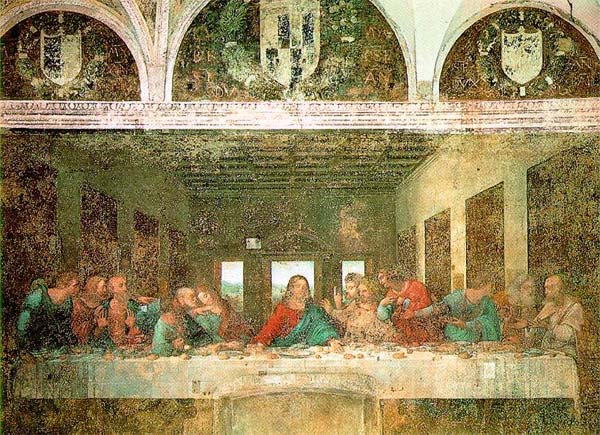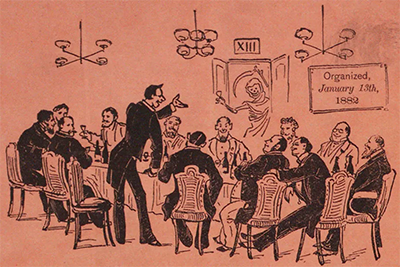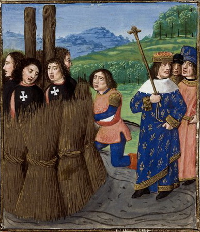Who's Afraid of Friday the 13th?
Friday the 13th is frightening to many, but why? Technically, a Friday's being on the 13th of a month requires that month to begin on a Sunday. Any 12-month January–December calendar will have at least one Friday the 13th; the maximum number possible in that calendar year is three. So it's not an occurrence that is all that common. However, when it does occur, it frightens some people and amuses others; to a great many others, it is no big deal. 
Why the fear of Friday the 13th? Many psychologists would say that it is a manifestation of an even more basic fear of the number 13. To many people, encountering that number is anxiety-inducing. To this day, many hotels and other kinds of buildings do not have a 13th floor. Proving that assertion are data from construction companies and elevator manufacturers. The word in Greek for the fear of the number 13 is triskaidekaphobia. This is a very real condition from which many people suffer. Sources differ on the roots of such fear. Many origin stories involve stories from religions and from mythology. 
The most commonly cited example from the Christian tradition is that at the Last Supper, the last meal that Jesus shared with his 12 disciples, were 13 people. Presumably they all ate together on earlier occasions, but it was at that meal, tradition says, that Jesus declared his knowledge of the betrayal of Judas Iscariot. That announcement resulted in the scattering of the disciples, and Judas's actions led to the arrest and ultimate crucifixion of Jesus. A similar story comes from Norse mythology. Twelve Norse deities had their meal interrupted by the appearance of another deity, Loki, known as the trickster, the god of mischief. His attendance at the meal made the number 13; during the meal, one of the deities died. An example of suspicion of the number 13 in a historical context comes from the Code of Hammurabi, one of the most famous ancient legal texts. Initial listings of these laws did not include a law numbered 13. Historians later determined that the absence of the 13 was due to nothing more than a clerical error; but for those looking for reasons to fear a number, its absence suggested that like-minded did the compiling of those laws all those years ago. Another famous example from history is the order by France's King Philip IV to arrest the leaders of the Knights Templar. The medieval organization was famous for its knights, many of whom provided protection for people making pilgrimages to Jerusalem and elsewhere in the Holy Land. Templar knights also famously fought in the Crusades. But the Templars also enjoyed exemption from local laws and from taxation, all thanks to the protection of the pope, instituted by Innocent II in 1139. Not all European leaders held the Knights Templar in high esteem. As it turned out, Philip owed the order a lot of money because he had borrowed heavily from them in order to finance a war against So that was a Friday and a 13th. This is one of the oft-cited early examples of something terrible happening on that day of the week, on that day of the month. And the Greek word for the fear of Friday the 13th is paraskevidekatriaphobia. An alternate name involves Norse tradition: Friggatriskaidekaphobia combines the original fear of the number 13 with the name of the Norse goddess Frigg or Frigga, from whose name Friday comes. More fundamentally, many traditions list 12 as a "perfect" number, and so 1 more than a "perfect" number would be at the best "imperfect" and at the worst dangerous or something certainly to be avoided. More mundanely, the number 12 abounds in modern society: clocks have 12 hours on their face, years have 12 months, feet have 12 inches, juries have 12 members. How often do we see the number 13? Not so much. 
Not all discussions of the number 13 involve suffering from anxiety. One high-profile example from history involves rather famous individuals getting together to dispel a host of superstitions, including that ascribed to the number 13. The Thirteen Club formed in New York in the late 19th Century. Its founder was William Fowler (right), who had a fascination with the number. He graduated from Manhattan's Public School 13, at age 13. He was an architect who built 13 buildings. He served in the U.S. Army during the Civil War, fighting in 13 battles and retiring on Aug. 13, 1863. When it came time to buy a cottage, he did so on the 13th day of the month. (He later sold the cottage on a Friday the 13th, in April 1883.) 
The first meeting of New York's Thirteen Club was on Friday, January 13, 1882, at Fowler's Knickerbocker Cottage restaurant, on Sixth Avenue. They met in room 13 at 8:13 p.m. Once entering the room, they walked under a ladder. The dinner guests numbered 13, they sat at a table lit by 13 candles, and their dinner numbered 13 courses. Having survived what many would consider dangerous circumstances, the members of the club continued to speak out against superstitions for many years. At the founding dinner, some of the guests had opened their umbrellas inside and left them that way, defying a superstition. At other meetings, members of the Thirteen Club smashed mirrors, spilled salt, and did other things that would have horrified people afraid of such actions. The membership of the club eventually exceeded 400, including four former U.S. Presidents: Chester A. Arthur, Grover Cleveland, Benjamin Harrison, and Teddy Roosevelt. A London Thirteen Club soon followed. Both clubs enjoyed notoriety for a few decades, then faded into obscurity. During the time when the Thirteen Club was poking fun at such superstitions came the publication of a fiction work titled Friday the Thirteenth. The 1907 novel, by Boston stockbroker Thomas Lawson, followed the actions of a businessman who sought to crash the stock market on, naturally, a Friday the 13th. The book sold a great many copies and was the basis of a 1916 feature-length silent movie. More recently have come a series of horror movies of the same name, with the villain choosing a Friday the 13th to exact his revenge. All of these fears are very real to a great many people. Such is the nature of phobias. |
|
Social Studies for Kids
copyright 2002–2024
David White



 England in the 1290s. He was also suspicious of the motives of the order. Philip ordered members of the Knights Templar arrested, on Friday, the 13th of October, in 1307; this resulted in the torture and execution of several dozen Templars, including their top leaders, not only in France but also in other European countries.
England in the 1290s. He was also suspicious of the motives of the order. Philip ordered members of the Knights Templar arrested, on Friday, the 13th of October, in 1307; this resulted in the torture and execution of several dozen Templars, including their top leaders, not only in France but also in other European countries.
